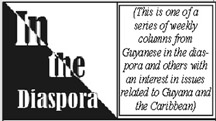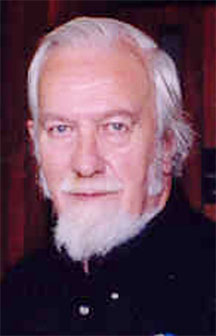Guyanese-born Ron Fanfair is well rooted on the communication highway of the Black community. He is a freelance writer/photographer whose weekly contributions to Share, Canada’s largest weekly ethnic newspaper allow him to inform, educate and entertain a wide cross-section of readers.
By Ron Fanfair
Note from Diaspora column editor, Alissa Trotz:
In November of last year, Caribbean journalism lost a stalwart and friend, with the sudden passing of Colin Rickards at his home in Toronto. Colin had written three Diaspora columns for this newspaper, including a memorable tribute to Guyanese author Edgar Mittelholzer. Colin’s association with the Diaspora column came out of a community event to mark the republication of four of Mittelholzer’s early novels by Peepal Tree Press. It was held on the Scarborough campus of the University of Toronto (Scarborough being home to a significant portion of the Guyanese-Canadian community), and was organized by the Caribbean Studies program where I teach. At the time I asked Colin how he wanted to be introduced, and he replied, “author and working journalist having had a lifelong interest in Caribbean writers and writing, and perhaps the only person in the room who actually knew Edgar Mittelholzer (he first met him in England in 1956, and drove Andrew Salkey, Jan Carew and George Lamming to his funeral outside London in 1965).” When I invited Colin to write up the event as well as to share his extensive knowledge on Mittelholzer with a Guyanese audience, he delivered a wonderful essay that we ran over two weeks in November 2010. To my delight and surprise, Colin went on to inform me that his relationship to Guyanese newspapers was older than me, and had started before independence: “I was the London Correspondent for ‘The Daily Chronicle‘ — when it was a privately sector-owned newspaper, before it became the government’s voice. At the time of the various Independence Conferences I did pieces for the old ‘Evening Post‘ and ‘The Sunday Argosy‘ and just prior to, then after, Independence, London Correspondent for ‘The Guiana Graphic.‘ So my name is not unknown to those with long memories!”
 As a weekly newspaper columnist, Colin was central to our efforts in the Caribbean Studies Program at the University of Toronto to deepen our relations with the wider community. My last correspondence with him was in early November. He sent me a newspaper article he had written urging people to attend an event that we had organized, a book launch by Valerie Wint about her father, ‘The Longer Run: A Daughter’s Story of Arthur Wint‘ (in 1948 at the London games, Wint became the first Jamaican athlete to win Olympic Gold). Less than two weeks later, I received the shocking news that Colin Rickards was with us no more.
As a weekly newspaper columnist, Colin was central to our efforts in the Caribbean Studies Program at the University of Toronto to deepen our relations with the wider community. My last correspondence with him was in early November. He sent me a newspaper article he had written urging people to attend an event that we had organized, a book launch by Valerie Wint about her father, ‘The Longer Run: A Daughter’s Story of Arthur Wint‘ (in 1948 at the London games, Wint became the first Jamaican athlete to win Olympic Gold). Less than two weeks later, I received the shocking news that Colin Rickards was with us no more.
On Monday April 18, 2011, the Diaspora column was authored by Colin, and was simply titled ‘Recognizing Rex Nettleford’s Legacy.’ Today it is our turn to pay tribute to Colin Rickards, and we do this by sharing a report filed by one of his colleagues, Toronto-based Guyanese journalist Ron Fanfair, which was carried in ‘Share.‘
The duty of the journalist is the same as that of the historian – to seek truth above all things – John Delaney, former Times of London editor.
Veteran journalist and author, Colin Rickards, used this line in his acceptance speech six years ago when a community organization presented him with an Award of Excellence in Print Media. It’s a mantra that defined the wordsmith and historian and one by which he will long be remembered by family, friends and colleagues.

In late November, Rickards suffered a fatal heart attack at his home in Toronto, Canada, where he had been living for over forty years. He would have celebrated his 74th birthday on December 15.
Born in England, Rickards was the London correspondent for several Caribbean newspapers and a frequent broadcaster for the British Broadcasting Corporation’s (BBC) Caribbean Service that, due to budgetary cuts, ceased operating in March 2011. He reported over the BBC Caribbean Service airwaves the many conferences that ended the short-lived West Indies Federation in 1962 and on the independence deliberations of Jamaica, Trinidad & Tobago, Guyana, Barbados and other Caribbean islands.
Rickards’ superiors at the BBC at the time included senior producers Alva Clarke of St Lucia and Tom Adams, who would go on to become the second Prime Minister of Barbados. Clarke died in 1994 at age 62 while Adams passed away in 1985 at 53.
Rickards travelled extensively in the Caribbean and Central America as a foreign correspondent for several British newspapers and the BBC World Service before settling in Canada in 1970. He edited the Toronto-based Caribbean Business News for 14 years and The West Indies and Caribbean Yearbook and contributed to the now defunct (Caribbean) Contrast newspaper and most of the community newspapers in the city, including the well known Caribbean paper Share where he spent six years as a staff writer and a decade as a columnist.
“My relationship with Colin began when he was at Share,” said Justice of the Peace and Guyanese author of The Mineworkers of Guyana, Dr Odida Quamina, who was a columnist at the newspaper in the early 1990s. “I placed great trust in his opinions, comments and analyses and we had frequent discussions on a whole range of subjects. I always learned something new at the end of our discussions.”
An editor/writer for eight years with yet another Caribbean newspaper (Pride), and a Jamaica Weekly Gleaner writer/feature writer, Rickards wrote a weekly column – ‘Caribbean People‘ – for Caribbean Camera newspaper and did book reviews for the St Lucia-based She magazine. At the time of his death, he was part of the local publication committee compiling a coffee-table book – When the Ackee Meets the Saltfish – to be launched later this year for Jamaica’s 50th independence anniversary.
“I am going to miss him dearly,” said committee chair Kamala-Jean Gopie. “Just a few hours before he died, he sent me the second draft of a piece he did for the book… about Canada-Jamaica connections since the late 1700s. The first draft was a bit too long and I had asked him to trim it a bit, which he did. I didn’t read it until early Friday morning and then I learned a few hours later that he was no longer with us… Colin was at my home four days earlier for a meeting and we were communicating by e-mail right up until his death about various things to do with the book, including pricing and distribution strategies. He had started a second article for the book looking at Jamaica from the landing of Columbus in 1493 right up to independence in 1962… He was a fountain of knowledge who had a special way of putting things into a historical context. His loss is immeasurable and he will be missed.”
Rickards also sat on the advisory board of the Caribbean Tourism Organization’s new scholarship foundation, which will provide monetary awards to students of Caribbean heritage in Canada with an interest in tourism. Dominican-born Justice Dr Irving Andre, himself a prolific writer and author of 13 books, noted, “I saw him two days before his death at a meeting and he was telling me about the research he was doing into Jamaicans’ presence in Canada. During the discussion, he also told me he had just uncovered some documents relating to when a number of West Indians came to Canada in the 18th century to assist with the education of ex-slaves. He showed me the names of two Dominicans and I was just as excited as (he was). His death is a huge loss. He had an encyclopedic knowledge, he was committed to the community and his writing skills and research were exemplary.”
Rickards was a member of the Who’s Who in Black Canada directory’s advisory group and the University of the West Indies (UWI) Benefit Gala Committee which raises funds for scholarships and honours graduates and university supporters who are making significant contributions in Canada. “We are saddened to learn of his passing,” said Elizabeth Buchanan-Hind, Jamaica-based executive director of the university’s Institutional Advancement Division. “He gave so willingly of himself to the university and we are forever grateful for the tremendous support he gave to all of our endeavours in Toronto.”
Rickards authored nine non-fiction books, including The Man from Devil’s Island that tells the story of Etienne Artaud who survived 21 years as a prisoner in the world’s most notorious penal colony in French Guiana, and Hand of Captain Danjou; Camerone and the French Foreign Legion in Mexico, 30th April 1863, the story of 49 French Legion members – led by Captain Jean Danjou – who, on that day, battled some 2,000 Mexicans at Camerone in south-eastern Mexico.
A celebration of his life was held in Toronto in December after his remains were cremated during a private ceremony. He was a dedicated friend of the Caribbean – a member of the community in every respect – and a true friend who I could call on at any time to converse on any subject or just tap into his enormous knowledge base. He is survived by his wife of 37 years, Ida and son, Damian.




